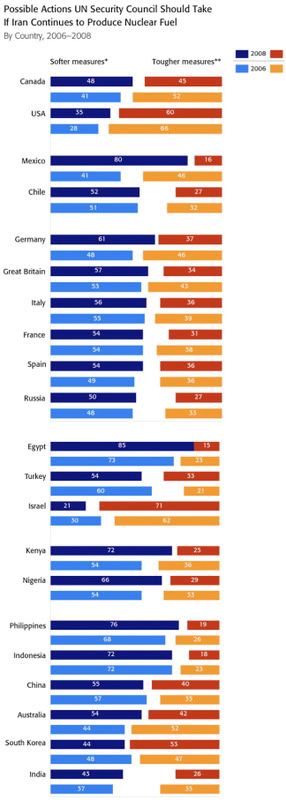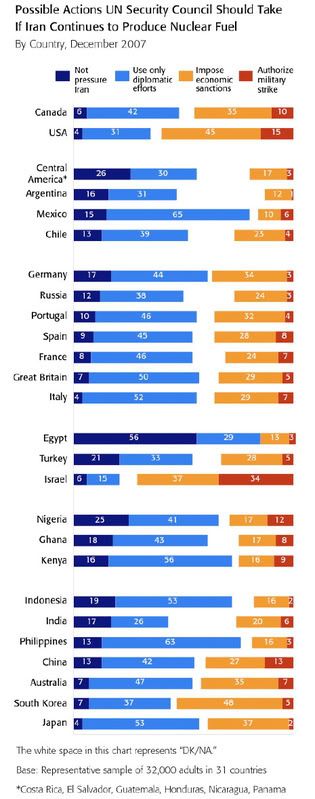 |  |
Notice that (1) advocates of military strikes are minuscule in almost all nations, being sizable only in Israel (where they constitute the second largest bloc); and (2) even in the USA and Israel they are outnumbered by supporters of sanctions, by a large margin in the former.
Those who are still capable of rooting for bigger and badder military adventurism, having recognized (at least some of) its consequences in Iraq (if not those of imperialist interventions elsewhere), are true believers, unlikely to change their minds whatever leftists might say.
Those whose minds can be, and must be, changed are those who advocate "only diplomatic efforts" and those who want to "impose economic sanctions."
What's our message? The main point we need to get across is this: sanctions are not an alternative to war, but a prelude to it, so "diplomatic efforts" must be made against sanctions (without which clarification Washington can easily merge the pro-diplomacy and pro-sanctions blocs into a diplomacy for sanctions bloc).
We have seen how the use of economic warfare segues into the use of military force, in Iraq, most obviously, but also in Haiti, Afghanistan, Yugoslavia, and elsewhere. Economic sanctions degrade their target nation's capacity for self defense, materially by diminishing the nation's ability to maintain, let alone upgrade, economic foundations and military apparatuses for it, and psychologically by aggravating existing contradictions and antagonisms and sowing new ones within the target nation. That creates an opportunity for the empire. And, when sanctions fail to change behavior of the target government to the satisfaction of the empire, that creates a pretext . . . which is easy to do, for the empire merely needs to keep changing its demand (as it already has on Iran, from answering "outstanding questions" that the International Atomic Energy Agency has to stopping uranium enrichment regardless of the fact that the IAEA says Iran has answered all of them and to providing "additional clarifications" about information allegedly contained in the dubious laptop procured by MEK, a notorious anti-Iranian terrorist cult) so the target government can never meet it.
The time to act is now. If Washington succeeds in putting together a coalition of governments -- in which "center-left" political parties play the key role -- that will enforce the sanctions that really "work," the game is over for the Iranian people.
No matter how much the White House tries to stoke pro-war sentiment (so far having influence only over Israelis), it doesn't have troops for a ground invasion for now, with its troops tied up in Iraq, Afghanistan, and elsewhere; and no matter how badly it wants to sanction Iran, it cannot do so directly, for, after decades of unilateral US sanctions, Iran's main trade partners are now Asians and Europeans. Therefore, Washington seeks to wield its (declining but still existing) dollar hegemony to economically and politically isolate Iran, especially from Asia and Europe, but also from the rest of the world. Tehran seeks to do the opposite.
This is an international struggle that best illustrates the complex reality of imperialism today, whose modus operandi is not inter-imperialist rivalry but incorporation of the power elites and ruling classes (overlapping categories) of more and more nations (which is what the media actually mean when they speak of the "international community"), so that there will eventually be "nothing outside the empire" (the empire's preferred future that Michael Hardt and Antonio Negri mistook for its present). What the Iranians are up against, in other words, is not US imperialism plain and simple but a multinational empire under US hegemony, in which nations such as India, Brazil, and South Africa play increasing roles.
As it happens, however, Washington's demand regarding Iran is against the vital short-term interests of many nations in the world, since few will benefit from moves that cannot but aggravate the energy supply bottlenecks that are (combined with the declining dollar and surging energy demand among energy exporters as well as emerging industrial powers such as China and India) directly pushing up fuel prices, indirectly raising food prices, and helping create a specter of stagflation or even depression (since higher energy prices, in addition to its own current account deficit, constrain the US government's ability to resolve the crisis of credit), and against the long-term interests of just about all of them, especially in the global South. The struggle is not so much between Iran and the USA as in each nation, between its own objective interests (national development and international equality) and Washington's subjective preference (US hegemony).




No comments:
Post a Comment